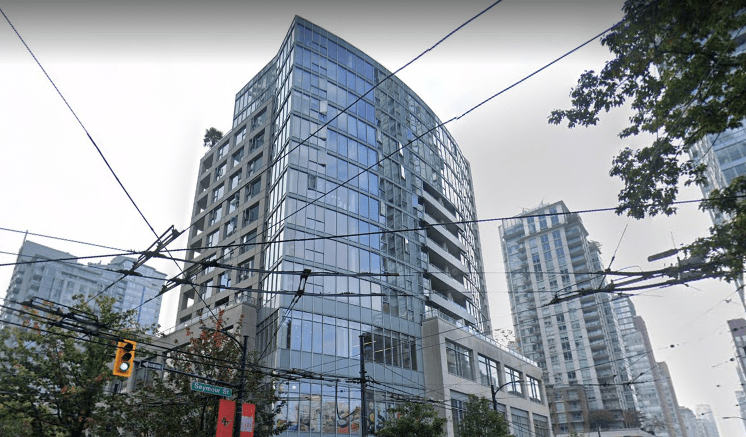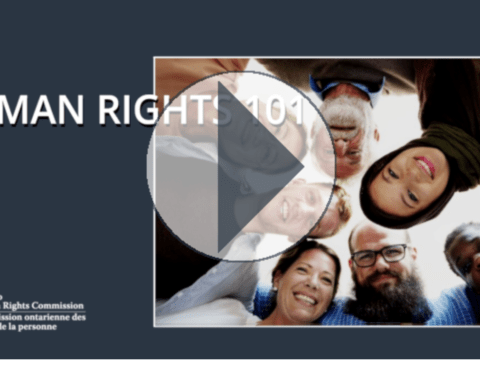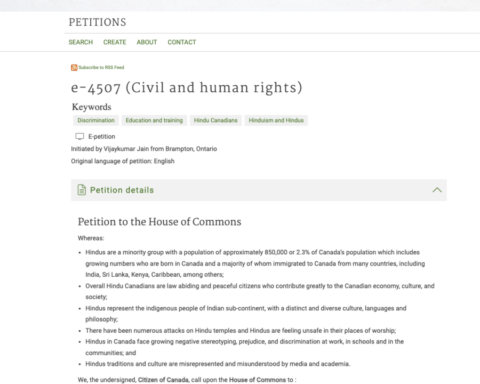In a recent ruling, the British Columbia Human Rights Tribunal ordered two B.C. residents to pay $9,755 in compensation for using casteist slurs during altercations.
This decision is the latest to address caste-based discrimination in North America, with several jurisdictions bringing in laws and motions to ban it.
The B.C. tribunal ruling comes on the heels of the Toronto District School Board (TDSB) approving a motion to address casteism on Mar. 8. The TDSB motion is the first move by a Canadian jurisdiction to create a formal mechanism to acknowledge and address caste as its own category of discrimination. It was approved, with most trustees voting in favour, meaning TDSB will write to the Ontario Human Rights Commission to create a framework for implementation.
According to 2016 census reports, South Asians make up about 30 per cent of all visible minorities in Ontario and almost 9 per cent of the province’s total population. TDSB has nearly 600 schools with 247,000 students attending, and a 2020 demographics report shows South Asians made up the second largest student population — after white students — at 22 per cent.
“This is a big win for us. I have been asked about my caste a couple of times in Canada. I think they are not scared here,” Vijay Puli, a Toronto-based social worker and executive director of the South Asian Dalit Adivasi Network (SADAN), a not-for-profit organization for and by Dalit, Adivasi and other lower caste people in Canada, told New Canadian Media. “Back home in India, there is a law that bans people from asking about a person’s caste, but here there is no redressal mechanism. That is why the TDSB motion will go a long way in addressing the caste issue.”
Other SADAN members who were asked about how their caste affects where they live said new immigrants prefer to live in the same area as others from their own communities.
While anti-caste bias activists, like Puli, consider these as landmark victories and steps in the right direction, some Hindu groups believe that caste-based bias has a minimal presence in Canada and that the existing legal framework is adequate to address any issues.
Canadian Organization for Hindu Heritage Education (COHHE), a Toronto-based non-profit whose website says they “educate, promote and celebrate Hindu heritage,” publicly opposed the TDSB motion on Mar. 5.
“We all understand there is no place for the caste system in society today; there is no caste in Canada. This is all being brought in as Hinduphobia,” said Dr. Ragini Sharma, president of COHHE. “It is a political movement, [and] has nothing to do with the upliftment of Dalits here.”
Lower caste people from various religions in South Asia have shared anecdotes of their experiences online, since news broke of the decisions in Ontario and B.C.
Casteism across countries and religions
The idea of caste-based discrimination as its own category of discrimination in Canadian jurisdictions has become a source of contention between two South Asian groups — those who support the decisions, and those who oppose them. While the former group said existing policies do not provide a mechanism for people to report caste-based discrimination and have it addressed, Sharma, a spokesperson for one of the latter groups, disagreed and said existing laws are sufficient.
“Look at the B.C. tribunal. They used the clause of ancestry, place of origin, and race, so why create a separate caste category?” Sharma said. “This will only divide us and further paint South Asians and Caribbeans as bigots.”
According to those who agree with the new rulings, ancestry by definition includes a person’s origins or ethnicity, and using the term “race” to cover caste could lead to ambiguity and dilute the issue.
“Caste is a protected category in India, and is not understood well here,” said Jai Birdi, co-founder of the Vancouver-based Chetna Association of Canada, which raises awareness about casteism globally. “So the [tribunal] ruling is a big win for us as it formally recognizes caste as a discriminatory practice … The need for caste as a separate category stems from the fact that people use caste names and slurs to ridicule others. It is about time we call a spade a spade.”
The caste system is a rigid South Asian social structuring system that has existed for thousands of years, and separates people into different social groups based on a hierarchy at birth. A person’s caste can be identified by their last name, family background, food habits, occupation, or racial profile. People in “lower castes” have historically been relegated to jobs that are deemed menial, and are afforded lower social status. In Hinduism, those at the bottom of the hierarchy are called Dalits or “untouchables.”
Though Hindu rights activists claim the B.C. human rights tribunal decision and TDSB’s motion is a means to target Hinduism, casteist practices also exist in other religious groups in South Asian communities.
“We know that caste practice exists among Sikhs as well, despite the scriptures not endorsing it,” Birdi said. “There is also unconscious bias among Muslims and Christians.”
Darshan Thanapackiam Sivahurunathan, a Sri Lankan-Canadian and a Dalit activist described witnessing casteist practices from Sri Lanka spill over into Toronto.
“While growing up in Sri Lanka, a street divided the dominant caste folks in our village and us. The dominant caste folks were the first to arrive and settle in Canada,” Sivahurunathan said. “Sri Lankans continue those practices in Canada as well. I have seen abusive casteist words in graffiti in Toronto.”
The big data question
The lack of data collected about caste-based discrimination is a point of argument among both groups. Hindu rights activists point to it as evidence of casteism being a non-issue in Canada. SADAN and Chetna members argue that a lack of understanding about casteism in Canada has led to there being no formal mechanism for people to report incidents.
“From a social justice perspective, we are talking about stigmatic experiences, and oppressed people do not speak about it publicly,” Birdi added. “Assuming we have data, it will not tell us the whole story.
Still, SADAN members have been trying to gather more information about how caste-based discrimination manifests in Canada. A lack of resources and funding poses their biggest challenge.
“As of now, our members have a lot of anecdotal evidence to share,” Puli said.

Shilpashree Jagannathan
Shilpashree Jagannathan is a journalist from India. She now lives in Toronto and has worked as a business reporter for leading newspapers in India. She has tracked telecom, infrastructure, and real estate news developments and has produced podcast series. She currently focuses on human rights, feminist movements, and other related issues in Canada and India. Her weekends are spent bird watching in one of the Toronto birding hotspots; she loves trails, biking, and a lot of sun.





Hindu right wingers love to claim that caste has nothing to do with them yet they also claim that they are targeted by this. How does this happen? If Hinduism has nothing to do with casteism than why are they so opposed to it? If they are so afraid that Hindus will be maligned by this, then why don’t they come out and openly support this legislation and show the world that Hinduism has no interest in caste bigotry. Instead, we see all other religious/ideological groups (Muslims, Sikhs, Christians, Buddhists, Leftists, etc.) oppose caste bigotry EXCEPT UPPER CASTE HINDUS!
Hindu Right Wingers are giving themselves a a bad name, no one else!